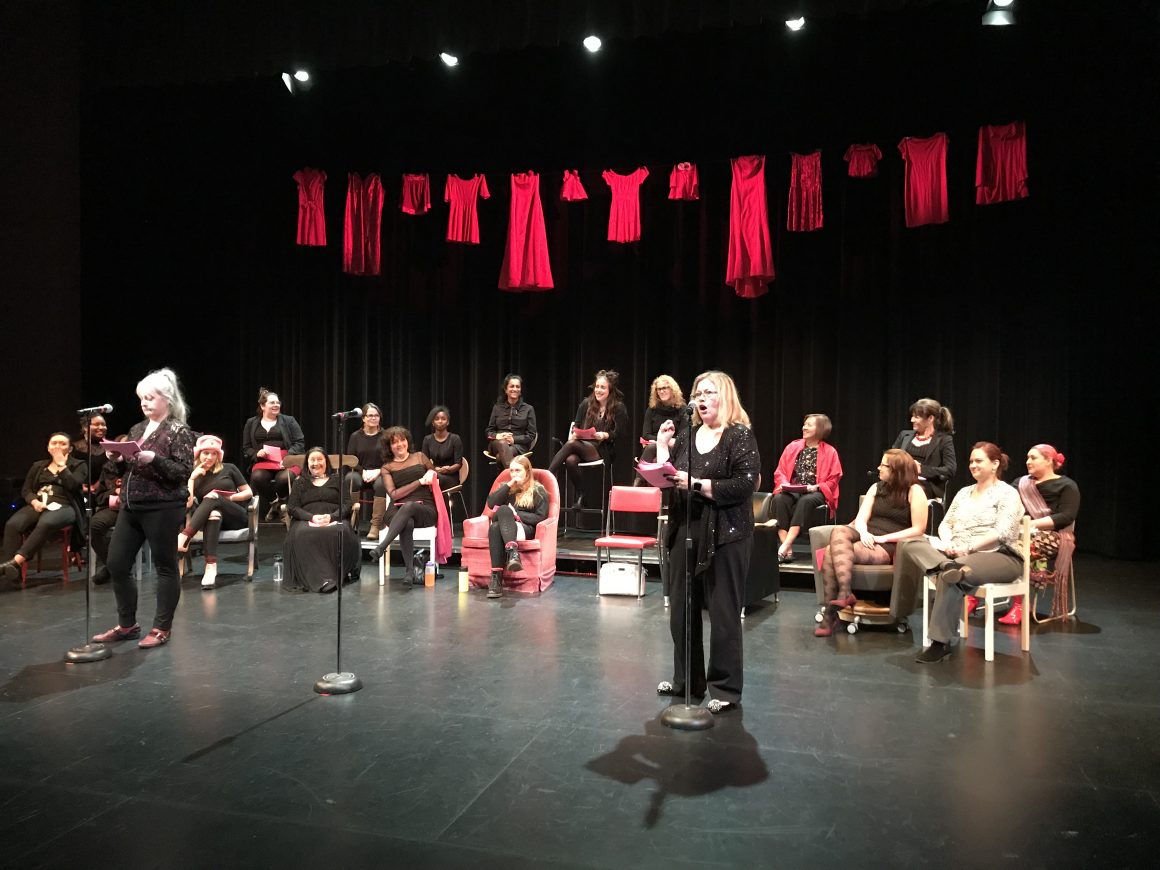
The Vagina Monologues celebrates womanhood
By Nikayla Goddard, November 19 2019 —
The University of Calgary’s seventh annual production of The Vagina Monologues celebrates the sexuality and strength of all women. Presented by the Women’s Resource Centre and Werklund School of Education on Nov. 7 at the University Theatre, this year’s production — in a similar fashion to all previous iterations — was met with great success and rave reviews from the audience.
The Vagina Monologues is a play written in 1996 by Eve Ensler, founder of the anti-violence against women activist movement and non-profit V-Day, based off of over 200 interviews she had with women. Conversations and questions surrounding their love life, sexuality, their relationship to and knowledge of their body, as well as experiences they had with discovering their sexual orientation, sexism, abuse, rape and many other hard-to-speak-about topics. The primary aim of The Vagina Monologues is to dispel myths and stereotypes and lighten insecurities women have around their bodies and place in the world.
Director Shannon Jones has been involved as a cast member since the start of U of C’s productions seven years ago, transitioning last year to the assistant director position, and this year to the director position.
Jones says one of the main ways they make this play inviting for everyday women to participate in is by making it a reader’s theatre, that is the actresses have cards with their lines and they aren’t required to memorize their parts.
“I think because of the way that the stories are told, you kind of forget it’s a reader’s theatre,” Jones explains. “You see the women who were just so amazing at embodying the characters at the monologues that it’s not distracting for them to have their lines there.”
Overall, Jones is pleased about this year’s performance and the impact it had on both the cast members and the audience.
“I was so happy. I was really emotional, actually, about how amazing the cast was and how well received it was by the audience. I was thrilled,” she says.
She continues to recollect how there was one woman this year who had said the word vagina maybe only two times before in all of her life. De-stigmatizing the word is one of the major breakthroughs the actresses have while participating in the play, and it’s an important one, she says.
Shirley Steinberg, a research professor in the Werklund School of Education, directed The Vagina Monologues for the previous six years before moving this year to being the consultant. Steinberg’s scope for the U of C’s production reveals that the monologues have both changed and stayed the same.
“The problem is that everything that was said 25 years ago has still not been addressed,” she said. “It’s just not changed… the reality is the gender difference in our world is still pretty much the same as it always has been. There’s this tragic notion of a powerful group of women saying ‘we have got to make a change’.
“It changes every year,” she continued. “There’s been different […] incarnations. We take it upon ourselves to use the original script and certain monologues that will never change, but we do add in a few of our own as part of our work.”
Over the years, different stories have been added, including monologues about domestic abuse, refugee women, specifically Rohingyan women, and trans women. This year a monologue on women’s scent was also added to address the pharmaceutical industry’s obsession with making women smell different. A clothesline of red dresses were also added above the stage to acknowledge Canada’s missing and murdered Indigenous women. The play opened with land acknowledgements and closed with the Strong Women’s song led by Indigenous and Métis women.
“The show is not sad, it’s not happy, it’s very funny and very potent in the tragic sequences,” Steinberg adds.
She also explained how the diversity of the women involved was phenomenal – diversity is their biggest strength, and “they just create an organism that is so vibrant and genius.” This year was also the smallest cast they have had, just over 20 members, “but they were dynamic and mighty,” she praises.
Program assistant at the Women’s Resource Centre Di Honorio was the stage manager for this year. She first participated in The Vagina Monologues five years ago, and it was how she discovered the Women’s Resource Centre and everything they had to offer.
Honorio remarked that the women this year were amazing to work with.
“Our cast did well and I’m really proud of everyone,” she says.
Honorio also agrees with Steinberg’s sentiment that the monologues are still relevant. “Five years ago, today, and five years from now…” Honorio continues. “I think these topics that we talk about, their relevance is just… you wonder why things haven’t changed, but then you’re also thankful for the progress that has been made. With plays like The Vagina Monologues, I think if we can start that conversation, continue it and then make a change, that’s what we hope by putting that on. There’s going to be so many stories, but there’s one that will relate to you… we’re putting this show on for a reason, and it’s to raise awareness and make a change.”
The Women’s Resource Centre has many other initiatives and programs beyond putting on The Vagina Monologues each year, including volunteer opportunities, peer support, a Women Guiding Women Mentorship and Leadership Training Program, a library with over 1,700 books, journal articles and magazines and an open, welcoming space on the fourth floor of MacEwan Student Centre, in room 482.
